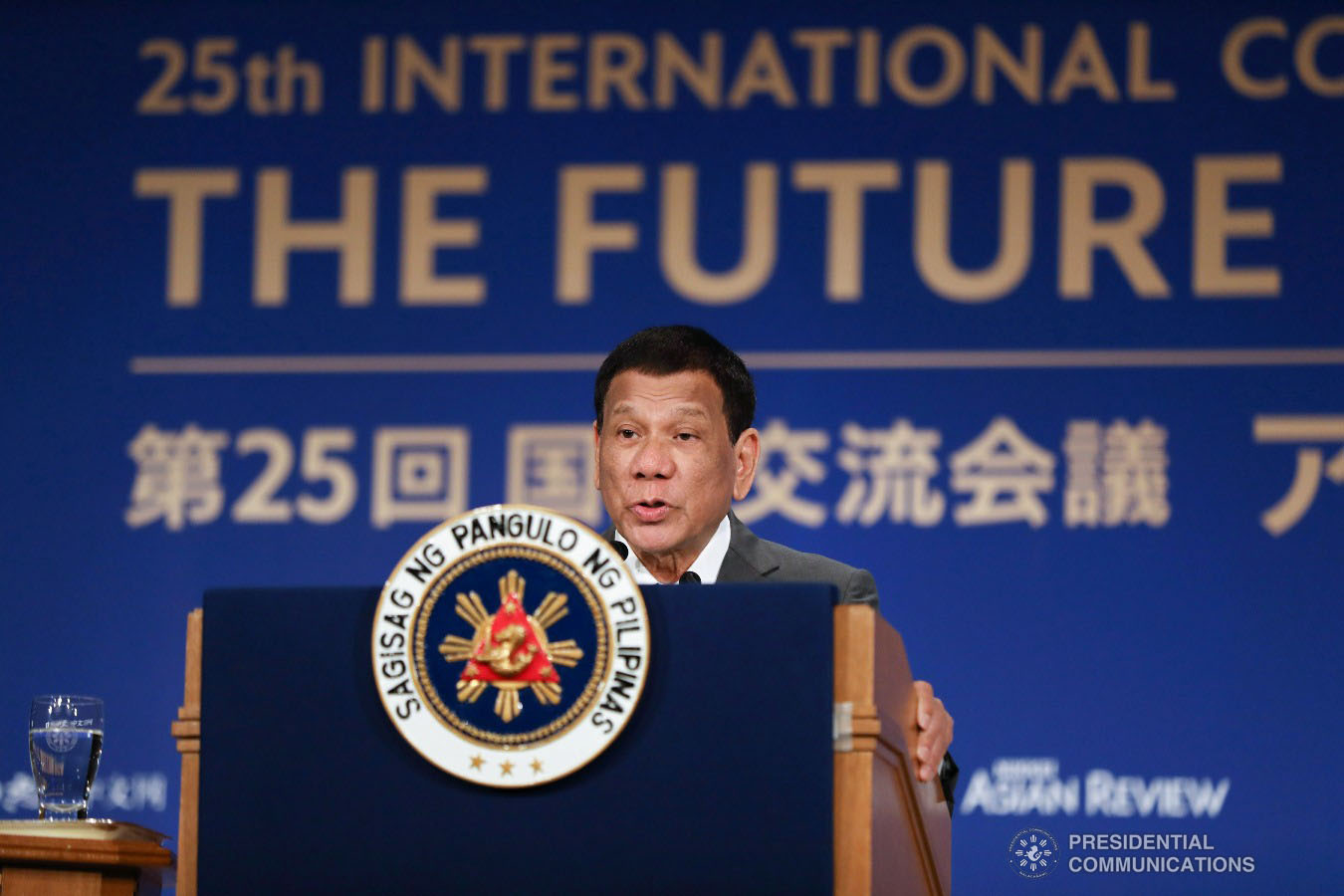
TOKYO, Japan—President Rodrigo Roa Duterte suggested on Friday for the immediate conclusion of a binding guideline in the South China Sea to ease regional tension and prevent the volatile situation from spiraling out of control.
Speaking before the participants of the Nikkei’s 25th International Conference on the Future of Asia, President Duterte said he received information that the works on a binding code of conduct in the South China Sea would be concluded in two years.
So far, China and the Southeast Asian Nations (ASEAN) settled for a non-binding Declaration on the Conduct of Parties in the South China Sea (DOC) in 2002.
“I would not want to impose my own…it would be my last word, but if I get a chance to visit Beijing again, I’ll try to talk to President Xi Jinping,” he said.
“And the longer it takes for the issue to be there… it is always a flashpoint for trouble. Not only that because of the absence of the conduct of the sea, France, Britain, America are testing the waters,” the President explained, enumerating the major powers that conduct freedom of navigation in the contested region.
He expressed sadness for being powerless to do anything, stressing however that leading stakeholders could come to terms to resolve the dispute soon.
“But I just hope that China would come up with conduct of the sea soon and somebody should reach out to the United States. Because if you leave it to them to talk, nothing will happen,” the President said.
“There is so much animosity covered by sweet talking about how they desire to have an agreement. But nobody is pushing and the intrusions as far as China is concerned….it’s in their waters.”
Also, the President discussed during the conference shifting global balance of power from West to East that resulted in Asia becoming an arena for big power competition with all risks and opportunities.
The President likewise expressed deep concern over the ongoing trade war between the US and China, which has been creating uncertainty and tension.
“It is causing downward stressors on the global economy. It is becoming a protracted war on the global and trade investments everywhere,” he said, noting there must be a resolution soon.
Threats of climate change, terrorism
The changing nature of non-traditional security issues such as terrorism, climate change, and transnational crimes add to the global volatility, President Duterte said.
Unilateralist, protectionist, and nativist tendencies are rising in some parts of the globe, which call for unity among nations, according to the Chief Executive.
Terrorism is becoming a major threat, as it continues to fester and threatens the very foundations of civilized societies of the world.
“As terrorists and violent extremists proceed with their tasks of tearing up the international community, they are forcing us to rethink our ideas of borders and protection,” the President said.
Another concern is climate change as it exposes the vulnerabilities of small and weak nations to natural calamities. Developing countries that have contributed the least to global warming, like the Philippines, suffer the most from its horrendous consequences.
The Philippines, he said, often doubly suffer when typhoons strike. “The poorest of our poor bear the brunt of damage, becoming even poorer in the aftermath. Governments with limited resources and capabilities have to contend with this spiral of suffering on top of urgent development priorities.”
As the Philippines joined the global consensus to fight climate change, the President hopes that the consensus will hold accountable countries that are considered major polluters.
Vibrant Philippine economy
The President also told his audience Friday that his government is determined to catapult the Philippines to the ranks of upper middle-income countries with a thriving knowledge economy.
“I am determined to see our policies support the poor. We enacted the Free Tertiary Education and Universal Healthcare to give our people safety nets for the basic means to lead a life of dignity,” he said.
Winning on a platform of law and order, President Duterte said he wishes to imitate Japan, with a population having strong commitment to follow the law and more developed civic mindedness.
To eliminate illegal drugs, he said his administration institutionalized the Philippine Anti-Illegal Drugs Strategy in 2018.
Mindanao, the long-neglected part of the country, will not be left behind, he stressed.
“Among the most positive developments is the ratification of the Bangsamoro Organic Law. We are now having a relatively peaceful central Mindanao for the Moro…most of the Muslim populations are there. We are now in the process of transition,” he said.
Nikkei’s 25th International Conference on the Future of Asia has a theme “Seeking a New Global Order—Overcoming the Chaos.” PND

